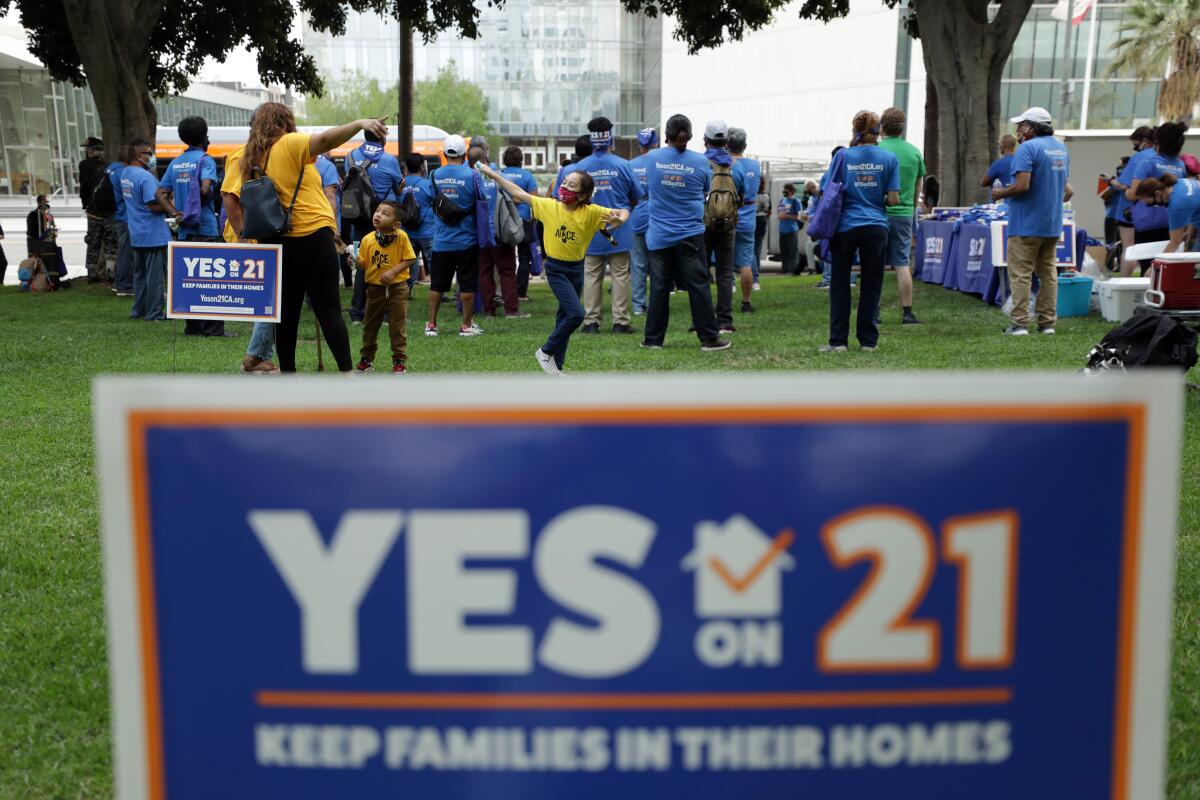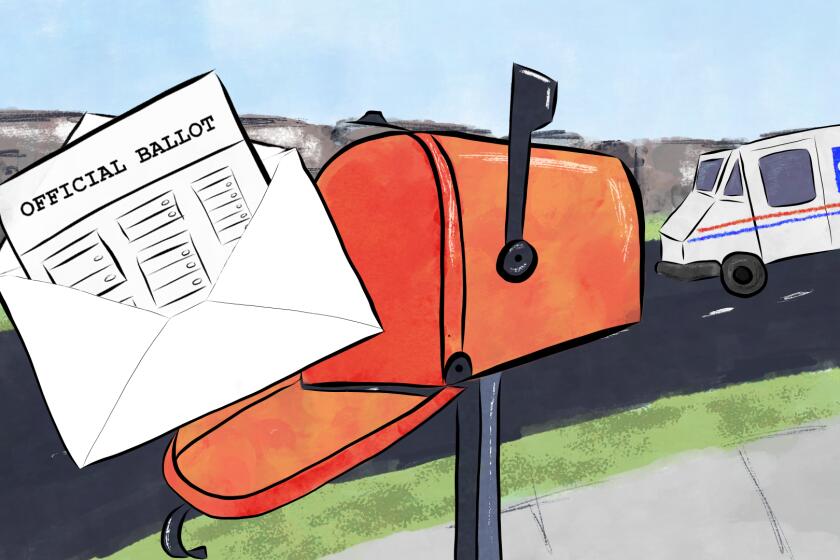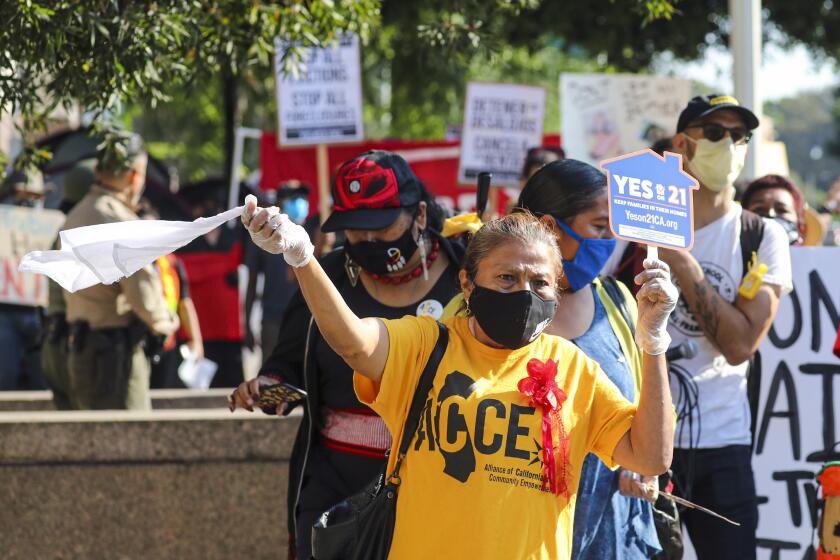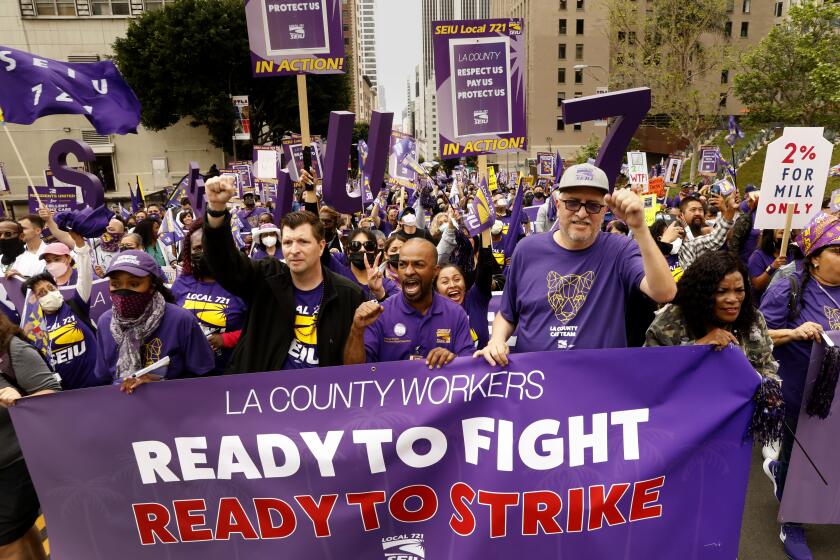Prop. 21: Does expanding rent control make sense in a COVID recession?

- Share via
The last time California voters weighed a ballot measure that would have enabled the sharp expansion of rent control, the economy was growing, rent was rising and many tenants were struggling.
Now, after rejecting that measure in 2018, voters are deciding on a similar initiative, Proposition 21.
This time the backdrop is different: Rent is falling in big cities, but millions of people are out of work. Tenants worry they’ll lose their homes; mom-and-pop landlords fret they’ll face foreclosure.
Both supporters and opponents of Proposition 21 cite the new COVID-19 reality as they push for the passage or rejection of the measure on the Nov. 3 ballot.
Here’s what you should know.
What is happening in the rental market?
Rent is on the decline in many of California’s metro areas.
According to rental website Apartment List, the largest drops are in ultra-pricey San Francisco and Santa Clara counties.
In Los Angeles County, rent for a vacant apartment fell 5.8% on average in September from a year earlier, even without factoring in concessions such as a month without a rent payment. In Orange County, rent slipped 1%.
Demand for more affordable suburban locations is rising, though. Rent rose 5% in Riverside County and 2.3% in Sacramento.
Landlords say they are lowering rents because they need to lure tenants as vacancies rise.
Richard Green, director of the USC Lusk Center for Real Estate, said some tenants are leaving because they’ve lost their jobs. Others are still employed but don’t want to live in an expensive apartment when the perks of city living are shut down or operating at reduced capacity.
Tenants who aren’t moving find landlords less likely to raise rent, data from real estate firm RealPage indicate. Average rent for renewals dropped 7.2% in San Francisco in July and was down 0.3% in Los Angeles County.
Within markets, there are disparities.
In San Francisco and San Jose, double-digit declines were seen in the fanciest buildings, as well at the lower end.
But in L.A., RealPage data show average asking rent in so-called Class C properties, usually older buildings without all the bells and whistles, while no longer rising by 3% to 4% as it was last year, was still up 0.2% in September — and that’s including concessions such as a month free of rent payments.
A new UC Berkeley poll shows 37% of voters support Proposition 21 to expand rent control in the state.
How would Proposition 21 work?
Proposition 21 would let cities regulate rent on properties they currently cannot.
A statewide rent cap law that took effect this year limits annual rent increases to 5% plus inflation for apartment buildings more than 15 years old as well as single-family homes that are that old and owned by corporations or other institutional investors.
Local governments may impose stricter limits, but because of a 1995 state law known as the Costa-Hawkins Act, they generally can do so only on apartments built on or before a specific date: Feb 1, 1995.
In some cities, the date is earlier. In Los Angeles, the cut off is Oct. 1, 1978, and annual increases in those buildings are usually limited to 3%.
Costa-Hawkins gives landlords the right to set the initial rent when a new tenant moves in, with any annual caps then applying to that tenant. Local governments can’t regulate rent for single-family homes and condominiums.
Under Proposition 21, cities could put stricter caps on buildings more than 15 years old, including single-family homes and condos. A person who owns one or two single-family homes or condos, however, would be exempt.
Landlords could also face restrictions on increases for vacant units, something cities including West Hollywood and Santa Monica imposed until Costa-Hawkins outlawed the practice.
Under Proposition 21, local governments could limit the amount a landlord can raise the rent after a vacancy, as long as they allow at least a 15% increase from the previous tenant’s rent spread over a three-year period.
Cities can also choose to do what today is their only option: allow unlimited increases on vacant units.
As with current rent control laws, landlords under Proposition 21 must have the right to receive a “fair rate of return,” so it would be difficult for cities to force further rent cuts, said Fredric Woocher, the attorney for the Yes on 21 campaign.
What do supporters say?
René Moya, director for the Yes on 21 campaign, said expanding tougher caps is needed now more than ever. Yes, average rents have declined in some places, but the declines are uneven and don’t mean housing is suddenly affordable, he said.
The California unemployment rate stood at 11.4% in August and before the coronavirus crisis, more than half of California renters paid at least 30% of their income on rent, according to Harvard University’s Joint Center for Housing Studies. That’s the typical threshold above which rent is deemed unaffordable and those most likely to cross it were Black and Latino households — who are now more likely to have lost income because of the pandemic.
Although some landlords have lowered rent, some may still want to raise it, particularly if their tenants pay way below the current market. Moya said limits on increases upon vacancy would reduce the incentive for landlords to harass such tenants to leave both in good times and bad.
In times of pressing need, it would also be easier for cities to institute an outright rent freeze, Moya said.
Citing the coronavirus crisis, the Los Angeles City Council recently debated freezing rents on all rental units, but after the city attorney warned that was probably a violation of state law, the council settled on prohibiting increases in units subject to L.A.’s current rent control law — buildings built on or before Oct. 1, 1978.
Proposition 21 would also enable cities to lock in today’s relatively lower rents by restricting the ability of landlords to raise them when the economy recovers, Moya said.
“Every recession, renters bear the brunt of the crisis, and when the rebound happens, they are stuck with the costs of economic growth,” Moya said. “Let’s make sure [this] recovery is a just one.
“Right now local communities have neither the tools nor the choice to do what they need to do to protect people.”
What do opponents say?
Debra Carlton, executive vice president of government affairs for the California Apartment Assn., said adding the prospect of stricter rent controls down the line will result in far fewer rental units built, which would exacerbate the state’s supply shortage and make it harder to find a place to live. Already, developers say they find it hard to make projects work financially given the high cost of construction, not to mention the uncertainty surrounding the economy.
Carlton pointed to bills the state Legislature recently passed that she said help tenants without the negative effects of Proposition 21. Those include the state rent cap law, as well as an eviction protection measure for those affected financially by the coronavirus crisis.
That measure allows renters who attest to a financial hardship to be protected against eviction through the end of January, with most missed rent payments converted to consumer debt that landlords can’t evict for in the future, but can try to recover in small claim’s court.
“All the things the proponents are claiming for Proposition 21 and the reasons for it, don’t exist,” Carlton said.
Daniel Yukelson, executive director of the Apartment Assn. of Greater Los Angeles, said his members aren’t counting on getting the missed rent the state converted to consumer debt.
He said tenants have already abandoned leases early and landlords can’t collect what they’re owed.
If Proposition 21 passed, he said it would be another hit at precisely the wrong time — when some mom-and-pop landlords worry they’ll lose their properties because tenants can stay and not pay rent.
If cities put limits on increases for vacant units, Yukelson said mom-and-pop landlords — many who got into the business to fund their retirement — will find it tougher to keep up with rising costs for maintenance, insurance and other items such as trash hauling. That’s particularly true for people who have tenants now paying below-market rents.
“We call this the bankruptcy bill,” Yukelson said of Proposition 21. “People are just going to get out of the business — they are already getting out of the business.”
What will Proposition 21, the initiative to expand rent control in California, do?
What do experts say?
Brian Asquith, an economist with the Upjohn Institute in Michigan, said he thinks most property owners would be all right financially if cities imposed restrictions on vacant units because they’d have the ability to raise rent at least 15% from what the previous tenant last paid.
Under a landlord’s right to a “fair rate of return,” they’d also have the right — as they do today under existing measures — to petition for additional increases if they’re losing money.
But Yukelson said such options are too cumbersome.
One side effect that Asquith foresees from Proposition 21 if it passes and cities impose tougher measures: landlords converting apartment units into condos.
A frequently cited study from Stanford economists, for example, found rent control in San Francisco did just that and probably put upward pressure on rents citywide.
“It’s less about ‘Can I turn a profit anymore?’” said Asquith, who has studied California rent control laws. “It’s ‘The value proposition for doing this has been diminished and may be more so in the future.’”
In places that would enact stricter rules, Asquith predicted higher rents over time as supply is reduced and landlords who weren’t raising rents by 15% between vacancies start to do so.
Green of USC said the allowable rent increase limits for vacancies would probably keep that regulated market cheaper, though, but cause more properties to fall into disrepair as landlords find it harder to pay for maintenance. And because he believes construction would fall and landlords would convert to condos, he forecasts higher rents in the unregulated market.
“We’ve got to get vacancies up,” Green said. “What is happening in San Francisco right now or downtown L.A. shows what vacancies do.
“You have these places being vacated and you have rents falling very rapidly.”
Gary Painter, an economist and director of USC’s Sol Price Center for Social Innovation, said it is necessary to increase construction to help with affordability, but it will take a long time to make meaningful change.
In the meantime, he said Proposition 21 can give cities the option to enact reforms that will help tenants far sooner. For instance, the Stanford study also found rent control provided stability and reduced displacement, particularly among Black, Latino and other renters of color.
As it relates to building, Painter said he thinks the 15-year exemption for new construction means developers won’t pull back in a meaningful way. He said it may increase building as capital flows toward construction rather than the purchase of older properties.
“It can be more profitable to add supply if landlords can’t price as high,” Painter said.
Los Angeles developer Paul Schon said that’s not how his business partners view it.
“Our investors are already telling us that if Prop. 21 passes, they would want us to look at development opportunities in other states,” the co-founder of the Schon Tepler Group said, explaining even the fear cities would pass stricter rules is enough to scramble investment decisions.
More to Read
Inside the business of entertainment
The Wide Shot brings you news, analysis and insights on everything from streaming wars to production — and what it all means for the future.
You may occasionally receive promotional content from the Los Angeles Times.














